Foresight is our daily
business
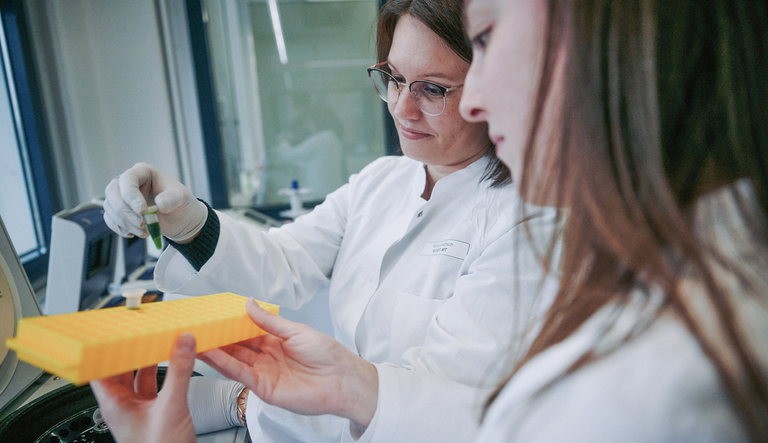
Fundamentals
Plant breeding for sustainable agriculture
Innovation at KWS is driven by research and development. KWS’ objective is to create high-performance varieties that meet various environmental and application requirements and deliver continuous value added to farmers. Plant breeding is a very research-intensive and long-term business. It takes an average of eight to ten years to develop a new, high-performance variety.
Using state-of-the-art breeding methods, KWS has generated steady yield progress for decades and supports agriculture with solutions to tackle future challenges – for example, through varieties that boast improved drought tolerance or need less pesticide. The company also increases genetic diversity, which is vital to improving crops, through its breeding work on plants. We contribute to sustainable agriculture by continuously improving yields, minimizing the use of resources and increasing varietal diversity and play a key role in supplying people with food.
Research & development report
Genome editing: KWS pushes ahead with trait development activities
From the idea to a cornerstone of KWS’ research: KWS’ Gateway Research Center (GRC) in St. Louis, USA celebrated its 10th anniversary on June 5, 2025. Since its inception, the GRC has become an integral part of our company’s international research activities. Today, it exemplifies scientific excellence, technological innovativeness and strategic foresight at KWS.
The GRC was founded in 2015 to specifically advance new breeding technologies such as genome editing. The choice of St. Louis as a location was strategically motivated: Its immediate proximity to the Donald Danforth Plant Science Center and integration in an international, dynamic plant research environment create ideal conditions for scientific exchange and technological development.
The GRC is now a driving force behind innovation in KWS’ research. Genome editing was initially used as a method to validate gene functions, develop technology and identify promising genes for agronomic plant traits. Genome editing also makes it possible to speed up breeding processes significantly and improve their precision. This shortens development times, increases the efficiency of plant breeding and enables genetic diversity to be leveraged to better effect. The focus at KWS is on developing innovative traits – in particular to increase resistance to plant diseases such as fungal, viral and insect infestation. The objective is to translate these innovations into marketable varieties and to better serve the needs of sustainable agriculture. In addition, new breeding technologies are used to identify weaknesses in plant defenses against emerging diseases. One example is SBR (Syndrome Basses Richesses = low sugar syndrome), a disease that is transmitted by cicadas and began appearing in sugarbeet cultivation regions in Southern Germany some years ago. This approach allows pinpointed and faster testing to determine whether certain genes have the potential to confer resistance to the disease and thus strengthen the plants’ resistance.
KWS has defined genome editing as one of the focal research priorities and has now developed and implemented a platform for most of its crops, including vegetables. The company aims to become a leader in trait development in Europe and to create initial products using new breeding technologies by the beginning of the next decade.
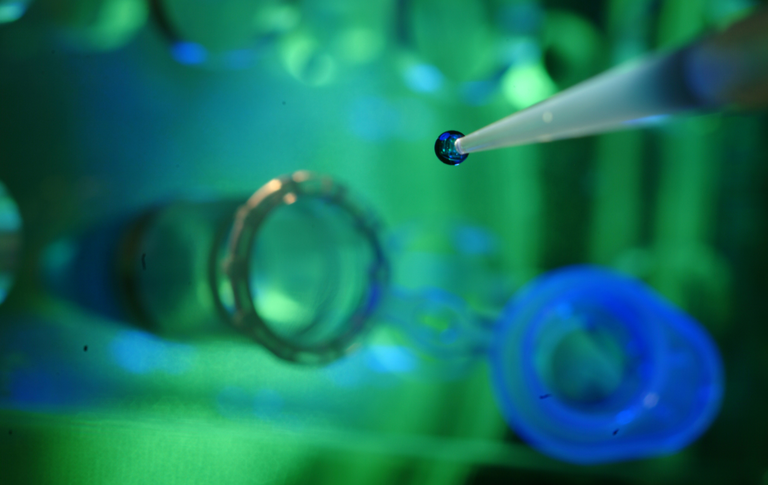
Sugarbeet: New varieties underscore innovation leadership
In the period under review, significant progress was made in expanding the sugarbeet variety portfolio, especially in terms of resistance to pests. This underlines KWS’ role as a leading provider of sustainable and future-oriented solutions in sugarbeet cultivation.
With the rollout of CR+ varieties that also offer nematode tolerance, KWS impressively demonstrates its ability to swiftly market breeding innovations tailored to the needs of farmers. CR+ varieties are a new generation of sugarbeet varieties that have been specifically bred for improved tolerance to the leaf spot disease Cercospora – one of the most damaging fungal diseases in sugarbeet farming worldwide. Nematodes are microscopic threadworms that infest the roots of sugarbeet and can cause considerable yield losses. The newly approved varieties with combined tolerance to Cercospora and nematodes are now the standout performers in key Central European markets such as France, Germany, the Netherlands and Belgium.
With the approval of IVONETTA KWS in Switzerland and GENEROSA KWS in the UK, KWS has taken an important step forward in the virus-resistant sugarbeet segment. These varieties are among the first of their kind to boast targeted resistance to yellowing viruses. The viruses are transmitted by aphids and can result in severe yield losses. Since neonicotinoids were banned in seed treatment, there has been no chemical means of protecting plants against aphids. The new varieties are testimony to KWS’ pioneering breeding work in a field where there have been hardly no marketable solutions to date. KWS is thus positioning itself in an increasingly relevant segment and will continue to systematically enhance the performance potential of virus-resistant varieties.
The first official approval of CONVISO® SMART varieties in markets such as Belgium, France and the Czech Republic marks another strategic milestone. This further increases the chances for the technology to penetrate the market. The CONVISO® SMART portfolio offers farmers an integrated solution for efficient weed management and impresses with its adaptability to different local conditions. By selectively expanding its variety portfolio in strategically relevant markets, KWS is strengthening its market presence and building on its leading position in modern sugarbeet breeding.
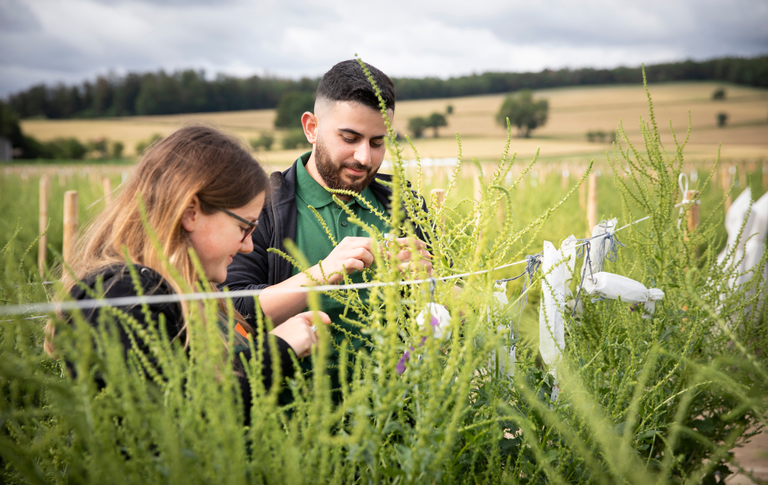
Successes in corn breeding: Eight new silage corn varieties in Germany – Grain corn performs impressively in Southeastern Europe
In fiscal 2024/2025, KWS achieved an outstanding result in silage corn breeding, gaining eight new approvals from the German Federal Office of Plant Varieties – more than any other provider. The new hybrids are distinguished not only by high yields, but also by their good digestibility. They improve feed conversion and energy intake in dairy cows, resulting in higher milk yields and economic benefits in dairy farming. Three varieties can be singled out by way of example: KWS AVESO, KWS BURANO and KWS RIBONO impress with their high variety performance and versatile usability. The varieties address different requirements in feed, biogas production and grain utilization, thereby making an important contribution to increasing efficiency in agricultural value chains.
In Southeastern Europe, KWS is continuing its success story in the grain corn segment. The strategy of developing locally adapted varieties with good drought tolerance has paid off here. The new generation of varieties has proven its worth over the past two years under extreme drought conditions in Hungary and Romania. In national variety trials, KWS hybrids demonstrated their superior drought tolerance and competitiveness.
Two high-performance grain corn hybrids with high yield stability – KWS OLTENIO and KWS GIRO – have been incorporated in the portfolio. Both varieties specifically address the challenges of climate volatility such as heat and drought.
In view of the growing climate-related challenges, KWS is systematically advancing its breeding of grain corn hybrids and expanding it to regions north and east of Hungary and Romania. With its varieties adapted to regional conditions, KWS is making a major contribution to sustainable corn cultivation in Europe in times of climate change.
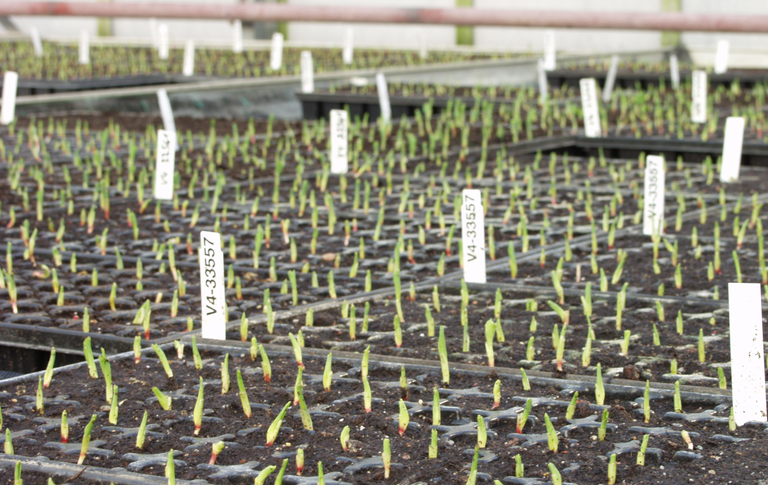
Sorghum: Initial hybrids from our own breeding program gain approval
Sorghum is native to warmer climes, is the fifth most important crop worldwide and is mainly grown at present in India, Africa, South America and North America. The area under cultivation for this type of millet in Europe is still relatively small at around 360,000 hectares, but has been growing steadily for some years due to climate change and increasing periods of drought. This is because the great advantage of sorghum over other crops is its very good drought tolerance and low susceptibility to diseases. In the most important EU states where it is grown (France, Italy and various countries in Southeastern Europe), 60% of sorghum is harvested for grain and 40% as a whole plant (for use as feed or biogas).
KWS has its own grain sorghum breeding program, from which the first fully competitive hybrid variety was approved in early 2025. Until now, KWS’ sorghum portfolio consisted of hybrids for use as biogas and (mostly in-licensed) hybrids for feed. Two further hybrid varieties are expected to be approved in 2026, while promising products are in the pipeline. This will enable KWS to establish itself as a powerful player in sorghum seed business in the medium term.
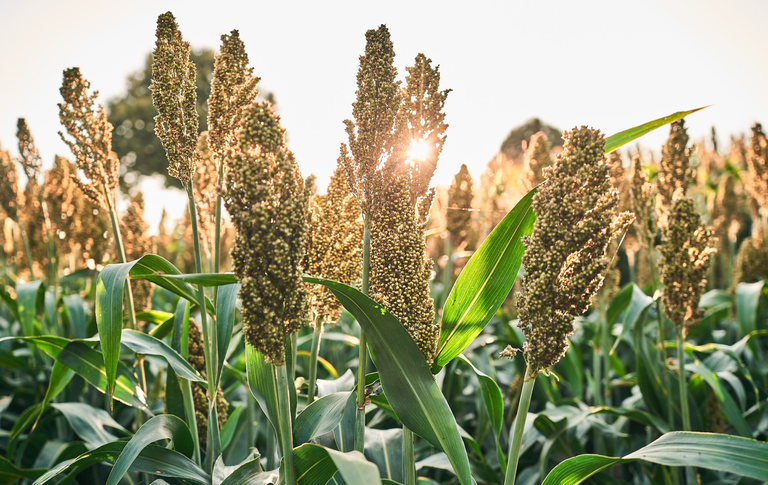
Vegetables: Variety from the new breeding program marketed for the first time
KWS entered vegetable seed business in 2019. By acquiring Pop Vriend Seeds (Netherlands) and Geneplanta S.r.l. (Italy), it also obtained these companies’ breeding programs, from which new varieties of spinach and tomatoes, for example, are regularly launched on the market. The first variety from the newly commenced vegetable breeding activities has now gained approved. This important step was achieved with the Tropikalia watermelon variety in Brazil. It was successfully adapted to the specific requirements of the Brazilian market and launched there in the 2024/2025 fiscal year. The continuous expansion of a global network of vegetable breeding stations supports our breeding activities long-term. The product pipeline for all vegetable crops that KWS has defined as strategically important (cucumbers, peppers, tomatoes, melons, watermelons, spinach, beans, red beet and Swiss chard) keeps on filling up.
The use of existing technological resources within the KWS Group contributes significantly to the efficiency of product development. Examples of the synergies within KWS include the shared use of marker technology and molecular biology methods. These technologies speed up the breeding of new varieties and strengthen innovativeness in vegetable breeding.
After around one year of construction, a cutting-edge research and development center was officially inaugurated in Andijk, the Netherlands, in June 2025. Covering an area of around 10,000 m², it is home to a 6,600 m² greenhouse, a preparation and research area for outdoor vegetables, as well as offices and laboratories. The 25 experts at the new facility will focus on breeding spinach, beans, red beet, Swiss chard, cucumbers and peppers.
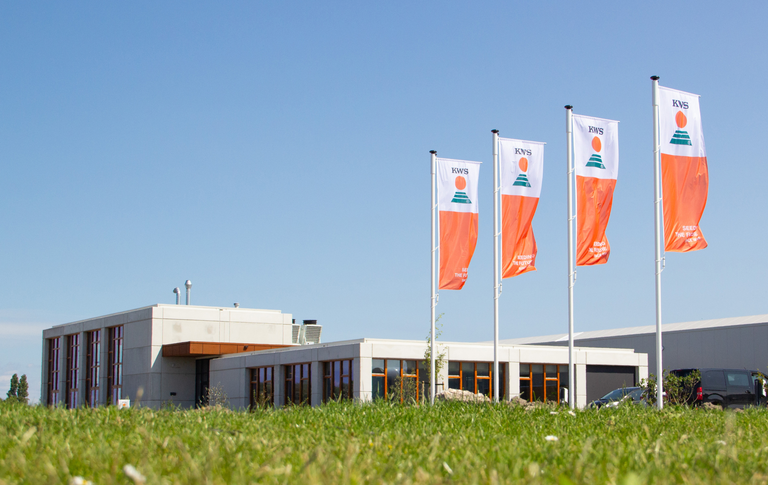
Further information can be found in our KWS Portrait
R&D expenditure
Investment in the future
To be successful in the long term, continuous and intense research activities are required. It takes eight to twelve years for a new variety to be approved and become available to the market. In the 2024/2025 business year we invested €349.0 million in research and development for high performing seeds.
